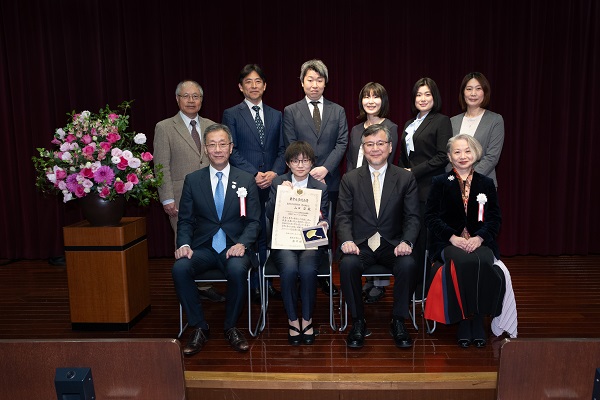Dr. Sora Yamaguchi, a researcher from this Graduate School (a third-year PhD student in the Department of Biomaterial Sciences at the time) received the AY2023 The University of Tokyo President’s Award
Dr. Sora Yamaguchi, a project researcher from this Graduate School (at the time, a third-year PhD student in the Laboratory of Forest Chemistry, Department of Biomaterial Sciences), received the AY2023 The University of Tokyo President's Award. Established in AY2002, this award has been given by the President to "a student at the University who has made particularly outstanding achievements in academics, extracurricular activities, and social activities, etc., and who has served as a role model for other students and enhanced the reputation of the University. " This is the seventh time a PhD student from this Graduate School has received this award in the academic achievement category.
Nominated research and activities
The nomination title was “Reaction mechanism of "cellulase," a key enzyme for building bioeconomy and decarbonized society.” In recent years, to prevent the crisis brought about by global climate change, a rapid shift has been made from the excessive use of fossil resources, which is a cause of climate change, to the use of biomass. Since the most abundant biomass on earth is wood, and its main component is cellulose, there are high expectations for technologies to degrade cellulose into glucose and provide it for bio-based manufacturing. From biochemical and structural biological perspectives, she has conducted research to reveal the mechanism of thermotolerance and catalysis of cellulase, an enzyme mushrooms produce to degrade wood, and summarized the results in her doctoral thesis. In parallel with the basic research in the laboratory, as described above, she has also made efforts to build a decarbonized society through social activities and outreach in the One Earth Guardians Development Program of this Graduate School and other University-wide organizations, etc.
Recipient’s comment
“For seven years since entering the Major in Chemistry of Bio-based Materials, I have experienced a dense student life with full of ups and downs at the Faculty of Agriculture and the Graduate School of Agricultural and Life Sciences. In particular, the Department of Biomaterial Sciences, to which I belonged, has supported and encouraged me in my daily research. In addition, as I explored what I could learn during the pandemic, I participated in various lectures and extracurricular activities outside my field, and I was helped by people from many Majors and Departments. The World-leading Innovative Graduate Study Program of the Sustainable Agriculture Education Program, which is mainly managed by this Graduate School’s faculty and staff, has also guided me to the doctoral course. I would like to thank all of you for your generous mentoring and support.”


